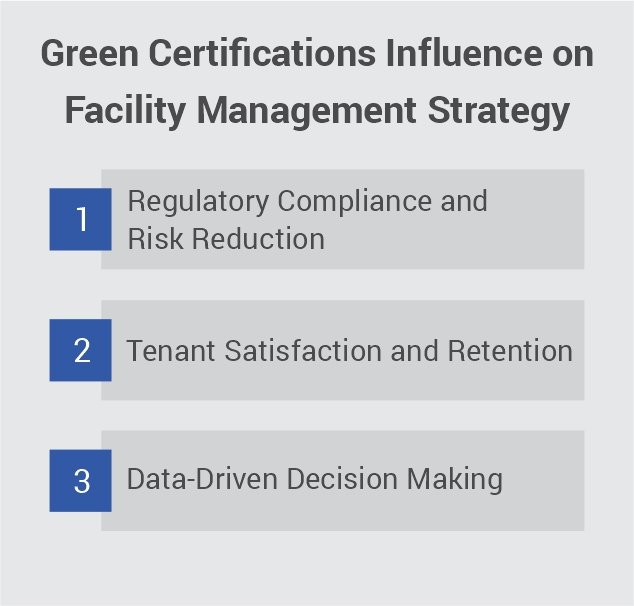Introduction:
The rapid pace of urbanization and industrial growth in India has significantly increased the demand for sustainable development. In this evolving landscape, green building certifications are no longer a niche initiative but a cornerstone of environmentally responsible infrastructure. These certifications not only promote energy efficiency and resource conservation but also align directly with the responsibilities of Facility Management Companies in India. As guardians of building performance, facility managers play a crucial role in ensuring that certified standards are met and maintained throughout a building’s lifecycle. This blog explores the pivotal role green building certifications play in shaping modern facility management solutions, with a deep dive into their impact on operations, compliance, cost savings, and sustainability.
What Are Green Building Certifications?
Green building certifications are formal recognitions awarded to buildings that meet specific environmental, sustainability, and energy performance criteria. These certifications assess multiple factors such as energy efficiency, water conservation, waste management, indoor environmental quality, and materials usage. Some of the most widely recognized green building certifications include:
- LEED (Leadership in Energy and Environmental Design): A globally recognized system developed by the U.S. Green Building Council.
- IGBC (Indian Green Building Council Certification): Tailored to Indian environmental priorities.
- GRIHA (Green Rating for Integrated Habitat Assessment): An indigenous rating system developed by TERI and the Indian government.
- BREEAM (Building Research Establishment Environmental Assessment Method): A UK-based system popular in global projects.
These certifications are not one-time achievements. They require continuous evaluation, making the role of facility management service providers indispensable in maintaining compliance and performance standards.
The Intersection of Green Buildings and Facility Management
Facility management is the backbone of building performance. From energy optimization to waste disposal, facility managers oversee critical functions that align closely with green certification benchmarks. Here’s how green building certifications integrate into facilities and management:
1. Operational Sustainability:
One of the core pillars of green building certifications is operational sustainability. Facility management companies in India are required to implement and oversee eco-friendly practices that reduce environmental impact. These include:
- Energy-efficient HVAC systems
- LED lighting and daylight utilization
- Smart metering and automation
- Optimized water usage through low-flow fixtures and rainwater harvesting
By embedding these practices, facility managers not only support certification requirements but also enhance operational efficiency and reduce overhead costs.
2. Preventive Maintenance and Lifecycle Management
Facility managers ensure:
Maintenance and operations in India, especially for green buildings, demand a shift from reactive maintenance to preventive and predictive strategies. Green certifications reward buildings that follow structured asset management plans to prolong equipment life and reduce resource consumption.
- Routine servicing of energy systems
- Monitoring air and water quality
- Preventing HVAC leakage
- Implementing Building Management Systems (BMS)
These proactive measures directly support certification scorecards while improving occupant comfort and lowering repair costs.
3. Waste Management and Recycling
Waste management is a crucial criterion for all green certifications. Facility management service providers are responsible for segregating, storing, and disposing of waste according to environmentally sound principles. This involves:
- Setting up recycling stations
- Composting organic waste
- Collaborating with certified waste disposal agencies
- Tracking and reporting waste metrics
These practices help buildings maintain their green credentials while demonstrating corporate responsibility.
How Green Certifications Influence Facility Management Strategy

A. Regulatory Compliance and Risk Reduction
Green certifications often align with local and international regulations on energy, emissions, and water use. For facility management companies in India, this alignment reduces the risk of non-compliance penalties and future-proofs buildings against stricter regulations.
B. Tenant Satisfaction and Retention
Certified green buildings are proven to provide better air quality, lighting, and temperature control, contributing to enhanced tenant well-being and productivity. Facility managers, through their daily operations, directly impact these parameters. Higher satisfaction leads to longer tenant leases and reduced vacancy rates.
C. Data-Driven Decision Making
To maintain certification, buildings need to continuously monitor their environmental impact. Facility managers rely on:
- Energy and water usage dashboards
- Waste tracking software
- IoT-enabled sensors for air quality and lighting
By analyzing this data, they can optimize resource usage, respond quickly to anomalies, and contribute to more effective facility management solutions.
Role of Facility Management Companies in India in Supporting Green Certifications
India is witnessing a surge in demand for eco-conscious infrastructure, especially in commercial, educational, industrial, and residential sectors. Leading facility management companies in India are now tailoring their services to meet green certification requirements.
Key contributions include:
- Green housekeeping using eco-friendly cleaning agents
- Sustainable landscaping with native plants and drip irrigation
- Energy audits and performance benchmarking
- Consultancy for retrofitting non-compliant buildings
By aligning their service offerings with green frameworks, these companies are transforming into strategic partners in sustainability rather than mere maintenance vendors.
Real-World Impact: Case Studies
1. Corporate Office in Bengaluru
A multinational IT company partnered with a facility management service provider to maintain their LEED Platinum-certified building. Through advanced HVAC monitoring, solar integration, and optimized housekeeping, the facility management team helped save 22% in annual energy consumption.
2. Manufacturing Plant in Pune
A GRIHA-certified manufacturing unit partnered with a facility management firm specializing in maintenance and operations in India. The FM team implemented waste segregation protocols and green landscaping, resulting in a 30% reduction in water consumption.
Challenges in Managing Green Certified Facilities
While the benefits are significant, managing green-certified buildings presents unique challenges:
- Higher initial costs for eco-friendly technologies and training
- Continuous compliance with evolving certification norms
- Specialized skill requirements for sustainability audits and equipment
- Resistance to change from traditional maintenance teams
To overcome these, facility management companies in India are investing in training, digital tools, and strong vendor ecosystems.
Future Outlook: Integrating ESG with Facility Management
As ESG (Environmental, Social, and Governance) mandates gain traction, green building certifications will become non-negotiable for large organizations. Facility managers will be at the core of ESG compliance, offering data, insights, and operational control.
Innovations such as:
- AI-driven energy analytics
- Smart building automation
- ESG-integrated facility dashboards
are redefining how facilities and management contribute to corporate sustainability goals.
Conclusion
Green building certifications are not just sustainability badges—they are living, operational blueprints for environmentally responsible infrastructure. Facility managers serve as the custodians of these standards, integrating sustainability into daily operations, compliance, and strategic goals.
For Facility Management Companies in India, this represents both a challenge and an opportunity—to transition from traditional upkeep roles to being key enablers of environmental performance. Whether it's through smarter maintenance and operations in India, digital innovation, or sustainable practices, the path forward is clear: Green is the future of facility management.
Choosing the right Facility Management Service Provider can ensure that your building not only earns a green certification but sustains it for years to come—delivering measurable value to owners, tenants, and the planet.
Industries we serve:
Automobile | Ancillary | Manufacturing | Pharmaceutical | Healthcare | Oil and Gas | FMCG | Education | Real Estate | Commercial
Also read: Measuring the ROI of Integrated Facility Management

